- Home
- George R. R. Martin
Turn of the Cards Page 4
Turn of the Cards Read online
Page 4
Nodding politely, he turned and walked out of the open-air stand.
“Out! Go away! You police, you provocateur!”
The tiny Moluccan restaurant’s tiny Moluccan owner waved stick arms at Mark while aproned kids, probably his, scurried for cover with practiced familiarity.
Recoiling, Mark held up his hands in front of his face. “Wait, man, I’m not from the police. All I want is a job.”
“Ha! Job. Job! I spit.” He spat. “Job!”
He got up in Mark’s face, or at least his sternum. “You American, huh? You no European?” He wound his hands furiously in the towel at his waist as if trying to choke it.
“That’s right. I’m American.”
“Ha!” The proprietor darted behind a counter that offered candies in bright wrappers covered with pictures of elephants and monkeys and unfamiliar script. He rummaged out of sight, produced a stack of papers that threatened to overflow his small fist.
“See? You see? All papers must be fill out. European Community make man write whole life story, write book to get job. But you American. You no got paper, no got permit. I fill out form on you, I still go to jail!”
It got him going again. He came rushing out flapping the sheaf of Euroforms in Mark’s face like a live chicken. “Out! Out now! Orang besar yang tipis get Molucca man big trouble!”
Outside, the sun was getting low, and the light was taking on that odd, soft quality of afternoon light in an ancient town in these latitudes, like a sepia-tone print from long ago.
Night coming soon. He shivered, though the afternoon was warm and a trifle muggy and he was sweating in his sweater. He put his head down and began to walk. Quite purposefully, though he had no idea where he was going.
“Marx,” the woman said as she wrote the name on a form pinned to a clipboard. “First name?”
“Julius,” Mark said.
She wrote that down too. She stood. She was a diminutive woman in a black blouse splashed with purple and a hint of yellow. Black skirt and stockings accented rather heavy legs. Black hair cut in a modified pageboy came down in pointed wings to either side of her triangular chin. She had lavender-and-black eye shadow and a general air of shopworn prettiness.
“Please come with me, Mr. Marx,” she said.
She turned and led off from the reception desk in a foyer lit yellow by electric bulbs in sconces in the wall, down a corridor of stone that must have been horribly expensive when it was laid near Spui Square during the troubled sixteenth century. Sint Antoninus Hof had begun life as a Catholic convent. It was now a homeless hostel.
Mark fondled the coin in his pocket and felt guilty as hell. He had money, and here he was trying to jump lodging that might have gone to some homeless person. He didn’t dare go back to his flat; the tiny tag-end of Takisian loot he’d had in his pocket when he went out the window was going to have to last him a good long time. That still didn’t make it feel right.
But we were talking life-and-death here. More than the money, a hotel would require Mark to surrender his passport. That would be it for him; the police checked hotel registrations on a daily basis. Holland looked with tolerance on its own drug users, but in the face of mounting pressure from the rest of the EuroCommunity as well as Big Brother across the Atlantic they were beginning to cooperate with American drug enforcers. And it wasn’t as if Mark was merely wanted for the few grams of forbidden chemicals — mainly psychedelics, as far out of fashion in the nineties as elephant bell — she could be proven to have had possession of.
Light spilled out an open door. It had the slightly irreal offcast of fluorescent light, a blue-tinged jitter that imparted a real night-of-the-living-dead look. She led him into its full glare.
Inside was an examining room. It had an old-timey look to Mark, wood where an American room would have been gleaming metal. A young doctor in a white coat sat reading a newspaper with his legs folded. As the woman led Mark in he jumped up, looking outraged.
He sputtered something in Dutch. Dutch always sounded like gargling to Mark; the country was pretty, the people friendly, and he loved the funky old streets of Amsterdam, but the language was just plain ugly. The doctor had long blond hair. It was thin on top.
“Mr. Marx needs shelter,” the woman said pointedly in English.
“Very well, Mrs. Wiersma,” the doctor said without enthusiasm. “I’ll see to him. Here, take off your shirt.”
Mrs. Wiersma smiled and nodded encouragement. She showed no sign of going away. As Mark pulled his sweater off, he couldn’t help but wonder whether it was because the Dutch had less body modesty or because the hostel staff were used to processing the homeless on the assembly line. There wasn’t much of a crowd tonight — Mrs. Wiersma and the doctor were the only people he’d seen. But it was early evening, sun barely down and warm yet. The real crush wouldn’t happen until the nighttime North Sea wind really began to bite.
The doctor examined Mark with distracted briskness — poked here, tapped here, placed the cold ring of the stethoscope to his skin and bade him breathe. Mark did.
“Any chronic conditions or communicable diseases?”
“No.”
The doctor tapped Mark a last time on the chest. “You sound good for one of ours,” he said, frowning slightly. “You smell better than most, also.”
“Thanks, man.”
The doctor nodded and turned away. Mark sat dangling his long legs off the end of the examining table and tried not to look at Mrs. Wiersma. She was staring at him with the earnest intensity of an indulgent grownup watching an unusually untalented neighbor child perform in a school pageant: knowing the child will screw up, but trying to beat the odds by sheer positive energy.
“Hold out your arm.”
“What?”
The doctor’s bored professionalism turned chill. Mark saw he held a hypodermic. “Your arm. I must draw blood. Come along, now, it won’t take a minute.”
He reached for Mark’s arm. Mark snatched it away and held his other hand protectively over the elbow. “What’re you testing for?”
Scowling openly now, the doctor turned and said something to Mrs. Wiersma in Dutch. “Certainly he has a right to know,” she answered in English. “We are not crowded now. Come, be gentle.”
The doctor sighed. “We must test for hepatitis, HIV, and xenovirus Takis-A.”
Mark felt as if the flesh of his hairless chest and arms had turned to the marble it resembled in the otherworldly light. “Wild card virus? W-why?”
“It is the law.”
“New government regulations,” Mrs. Wiersma said hurriedly. “There was much resistance here to the idea of mandatory testing. The European Commission proposed it last fall, and the Council of Ministers passed the directive. Because it concerned health and safety, there was nothing the Netherlands could do. The European Community holds sway.”
“Your arm,” the doctor said.
“No,” Mark said. “Wait. I — can’t.”
The doctor turned away. “No test, no stay.”
“Oh, please,” Mrs. Wiersma said. “We wish to help you. We can’t if you won’t let us.”
Mark moistened his lips. He made himself breathe quickly and shallowly, as if a panic attack was coming on. It didn’t take much acting skill. “I — I’m afraid of needles. Got it real bad.”
“Perhaps if you had a few minutes to think it over, to calm yourself,” Mrs. Wiersma said. “Really, it’s for your own good.”
“I haven’t got all night,” the doctor complained. “I have other duties.”
“Just let me think about it a little,” Mark said.
The doctor had lost interest in him, returning to his chair and paper. Mark hurriedly pulled on his shirt and sweater and walked back out to the front. Mrs. Wiersma hovered beside him, cooing at him and touching him dartingly on the elbow.
“I need to go outside a minute,” Mark said. He had a catch to his voice, as if he was in danger of throwing up at any moment. He had gotten so frothed
up by phony fear of needles and genuine fear of discovery that he really was about to puke.
“Certainly, certainly,” Mrs. Wiersma said, alighting behind her little wooden desk. “You poor man.”
Mark smiled wanly at her, nodded, walked out the arched front door into the evening, and away.
The naked pink neon woman bent over. The naked blue neon man leaped forward in an arc and thrust his prominently erect member into her from behind. Mark decided they were doing some pretty radical things with neon these days. A ripening of the breeze drove the rain into him where he huddled in the doorway. The rain pitted the surface of the canal with dark saucers and made the big purple, pink, and magenta oblongs of light tossed onto the water from the houses’ big front windows waver and bobble like ectoplasm. Mark shuddered, hugged himself with hands that felt inside and out like the cold wet hands of a statue.
Dutch households liked to leave their front curtains open so that passersby could admire the bourgeois splendor of their decor. The houses that lined the block away from the porn shop with the interesting and educational neon sign were no exception. It was the interior design that was unusual.
In each window sat a woman. Each was scantily clad, in costumes weighted heavily to garter belts and housecoats, though some outfits were tuned to the fetishist eye: a nurse, two nuns, and a probably Indonesian woman in chiffon and fake feathers that Mark had an awful suspicion was supposed to suggest a Native American princess.
The babes looked bored. Several did needlepoint, a couple read, and the Indian maid had a laptop computer propped on her thin bare thighs. Mark wasn’t sure how they managed to read in the gloom. The rows of garishly if inadequately lit windows reminded him irresistibly of the aquariums they used to have in cheap lounges back in the early sixties.
It was a poor night for business. No tourists were braving the rain to gawk at the cellulite on display, not even your usually indefatigably horny Japanese businessmen. Even as Mark watched, one of the nuns took off her headgear, tossed it in a corner, and drew the frilly drapes with a flourish of disgust.
He had heard somewhere that whorehouses sometimes offered the cheapest accommodations. Maybe that was true. The problem was, these weren’t whorehouses, and the occupants depended on rapid turnover, even if they weren’t getting much tonight. He somehow doubted any of them would be in a mood to cut a deal on crash space alone.
He craned his head out of the doorway that provided him largely symbolic shelter. No break in the weather. Maybe he’d drift back to the warehouse and see if any watchmen had yet spotted the window he’d jimmied to get out of his last night’s lie-up.
Sprout was a million miles away. Tomorrow morning didn’t seem much closer.
At least there weren’t any stars.
“Cocaine? Hashish? Heroin?”
Mark put his head down to avoid eye contact and practiced his broken-field running, trying to dodge the West African blacks doing the Leidseplein caracole on those funky bikes with the handlebars turned upside-down, like steer horns.
He was on his way to Vondel Park, just south of Leyden Square. You couldn’t crash in the huge park anymore, thanks to abuse of the privilege by the trend-followers and wannabes who appropriated the name “hippies” during the mid-seventies. It was still a major nexus for the European counterculture.
Mark, of course, had never actually been a member of the counterculture. That was his curse; that was the dramatic irony of his life. From the time he first discovered the glories of the counterculture, as a flat-topped biochemistry major in high-water pants in the fall of 1969, through his days as Cap’n Trips, the ace with the purple Uncle Sara suit and no visible powers whose not-so-secret secret identity was the mild-mannered owner of the last head shop on Manhattan Island, Mark’s journey had been a personal one. He had never actually participated to any extent in the Movement.
Of course, maybe that was why he was still keeping the faith in the early 1990s, when all others were become stockbrokers and informers. Mark didn’t think that way. He was more inclined to wonder if he’d ever been more than a spectator to his own life.
Now Mark, in desperation, was seeking the communal shelter of what remained of the counterculture. These days the kids were lean and mean, with spiked hair in exotic colors or the Wacht am Rhein butch cuts of the Greens — long hair and beards went with potbellies and Coke-bottle glasses. Not too congenial, but he was running out of options.
He had lived for a time as a federal fugitive on the streets of New York. But that was his own country, where you didn’t need identification papers to find lodging for the night, or a job — at least if you were as blond and tall as Mark. Amsterdam was a tolerant place, and the people friendly in their own reserved way. But for a foreigner on the run, all the colors were wrong and the corners were sharp and unwelcoming, and the rising wind of Euro-unification blew cold through streets that once sheltered the dissident and different.
He noticed the real-world wind coming up, sharp and cold and crisp as a knife-blade across the sunny, complacent heat of afternoon. He pulled his sweater tighter around him, hunched his shoulders. His clothes were still wet from the soaking they’d received last night.
Wind began to whistle in his ears. Scraps of trash brushed his legs like small frightened animals. He found himself leaning forward as he walked; he never realized a gale could come up quite this quickly, even off the turbulent North Sea.
Debris began to swirl around him.
A black pedal-pusher fell off his bike and went tumbling down the street, scattering pedestrians. Mark couldn’t hear anything. He was having trouble breathing.
The wind was too much for him. He stopped, and clutched himself, and shivered. He wondered what the hell was going on.
The wind stopped. Something small and hard and metallic rammed into his right kidney hard enough to keep him from recovering his breath.
“Walk this way, motherfucker,” an American voice hissed in his ear.
Chapter Five
The brown-haired young woman turned around in the driver’s seat of the Citroën and said, “Dr. Meadows. So good to see you again.”
She gave him a smile as chill and brittle as late frost and turned back forward to close her own door. Memory belatedly kicked in.
“Hey! I know you. You’re Mistral. I saw you”
He meant to say, I saw you in Aces High. But to do so would be to admit that he was Cap’n Trips, which he had some vague idea might prejudice his cause, even though he guessed just about everybody within reach of American satellite broadcasting knew it now anyway. Besides, she had said, “Good to see you again” … mostly he tripped on his tongue.
As he was doing so, the larger, blond member of the pair that had hustled him into the slope-backed French sedan slid in after him. “She calls herself Helen,” he said. “That’s Ms. Carlysle to assholes like you.”
The smaller, darker one got in the front passenger scat. There was something vaguely familiar about him. Maybe it was the nasty little pistol he’d stuck in Marks side and now stuck under Mark’s nose. Mark knew nothing about firearms, but he thought it was probably some kind of automatic weapon. He also had a suspicion that the little striations on its bullets that ballistics experts looked for under microscopes would bear a marked resemblance to those on the ones dug from victims of the notorious Damplein shooting two days ago. He closed his door. Mistral — Helen Carlysle? — let the clutch in and drove off.
“You don’t know how long I’ve waited for this,” the dark man said. He had the crazy intensity that was so popular in movie cops these days. “You’re going to burn, ass-wipe.”
That didn’t sound right. “What for?” he asked, a microsecond before realizing it made him sound like a dweeb.
The thin, feral face flushed. “You killed my partner! You killed Dooley, and you’re going down for it big time.”
Mark blinked. “What are you talking about? I didn’t kill anybody.” Not on Earth, anyway. He had a hard time dea
ling with some of what he’d done on Takis, but it was no time to bring that up.
“What about all those people you sold your poison to on the streets?” Carlysle asked in a strained voice.
Mark stared at her. About the only crime he wasn’t accused of was trafficking. The two male agents turned a momentary look of disbelief her way, then turned back to Mark, obviously choosing to edit her question out of their personal realities.
“Tim Dooley, DEA,” the beefy blond said. “His partner. He was killed in a shootout in your lab in New York.”
“In my lab?” Mark was completely disoriented now.
“Over your fucking head shop,” the dark-haired one said. “Oh, excuse me. Your New Age deli.”
“A couple of years ago,” Carlysle said over her shoulder. “About the time you pulled your disappearing act from judge Conower’s courtroom.”
Mark had no idea what they were talking about. After Judge Conower’s surprise decision — adjudging both Mark and his ex-wife unsuitable parents and remanding Sprout to the custody of the New York juvenile justice system — Mark had sort of phased out of the world for a while.
“He was actually shot by a Narcotics Division officer from NYPD,” Carlysle said. “It was what you might call a slight misunderstanding.”
“That doesn’t matter,” the dark-haired agent snarled. “You’re just as guilty as if you’d pulled the fucking trigger. That’s what the law says, dude.”
“That’s the craziest thing I ever heard in my life!” Mark blurted.
The agent shoved the muzzle of his machine pistol up Mark’s right nostril. “Don’t call me crazy!”
“Hey, Lynn,” the big blond agent said, reaching up as if to touch his partner’s arm, not quite daring to do so. “Take it easy. Don’t want to get blood on the upholstery, you know.”
The other man turned him a look of hatred so pure it rocked him back against the rear of the seat. Then he relaxed.

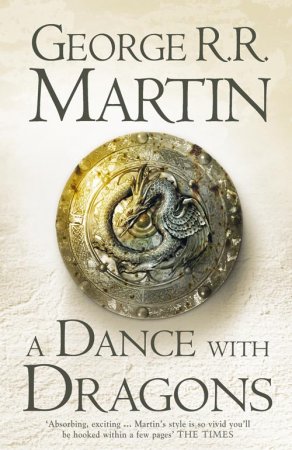 A Dance with Dragons
A Dance with Dragons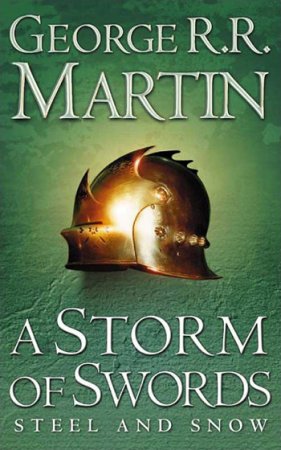 A Storm of Swords
A Storm of Swords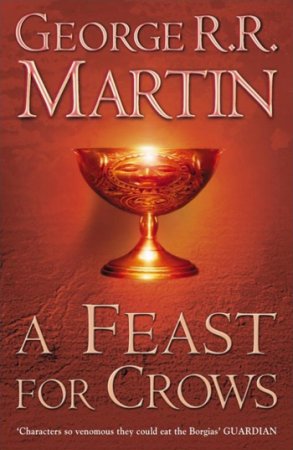 A Feast for Crows
A Feast for Crows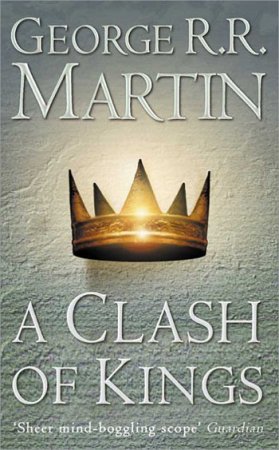 A Clash of Kings
A Clash of Kings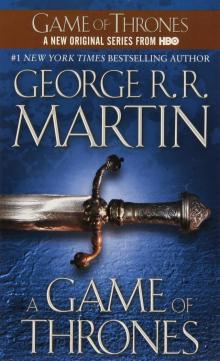 A Game of Thrones
A Game of Thrones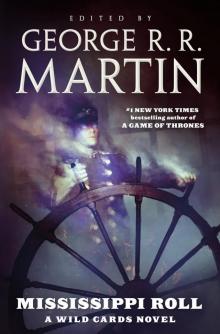 Mississippi Roll
Mississippi Roll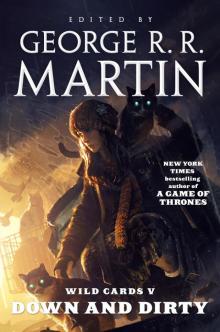 Wild Cards V: Down and Dirty
Wild Cards V: Down and Dirty Busted Flush
Busted Flush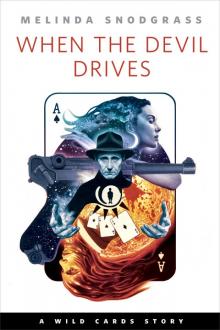 When the Devil Drives
When the Devil Drives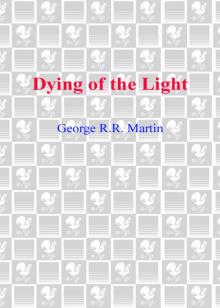 Dying of the Light
Dying of the Light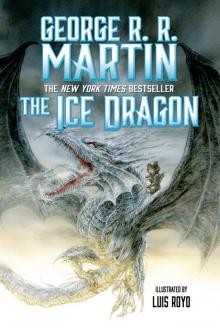 The Ice Dragon
The Ice Dragon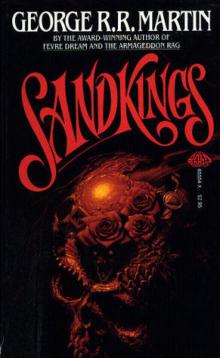 Sandkings
Sandkings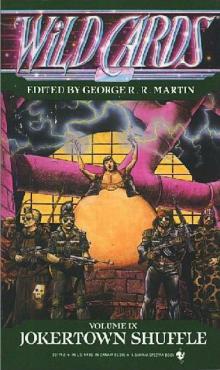 Jokertown Shuffle
Jokertown Shuffle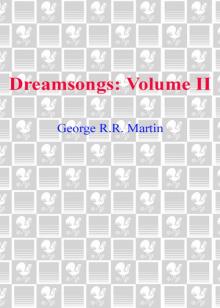 Dreamsongs. Volume II
Dreamsongs. Volume II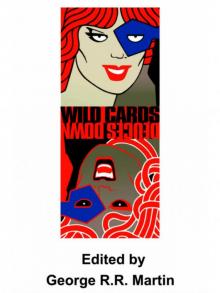 Deuces Down
Deuces Down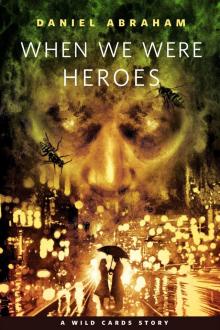 When We Were Heroes
When We Were Heroes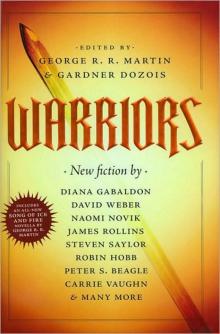 Warriors
Warriors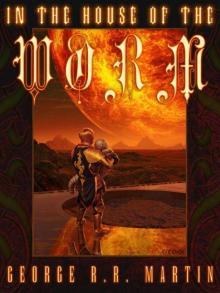 In the House of the Worm
In the House of the Worm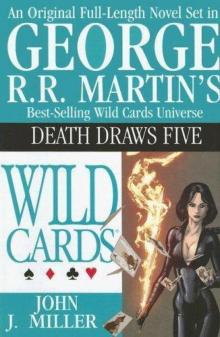 Death Draws Five
Death Draws Five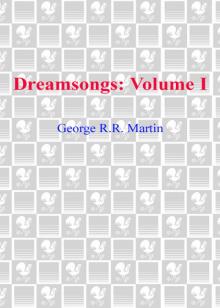 Dreamsongs. Volume I
Dreamsongs. Volume I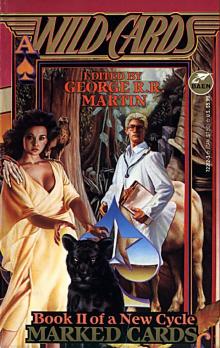 Marked Cards
Marked Cards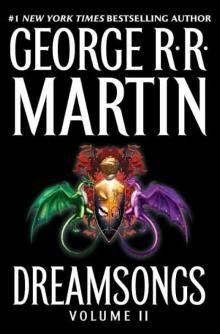 Dreamsongs
Dreamsongs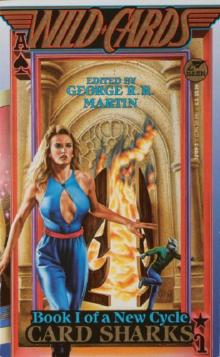 Card Sharks
Card Sharks Dangerous Women
Dangerous Women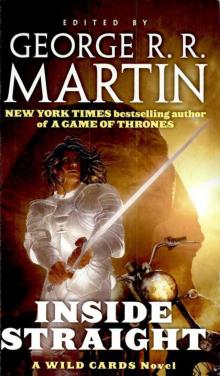 Inside Straight
Inside Straight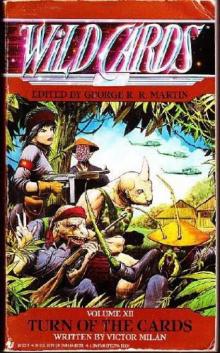 Turn of the Cards
Turn of the Cards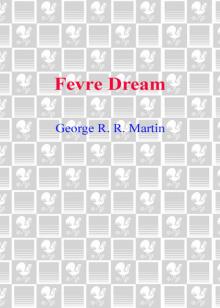 Fevre Dream
Fevre Dream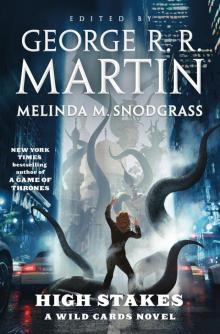 High Stakes: A Wild Cards Novel
High Stakes: A Wild Cards Novel Windhaven
Windhaven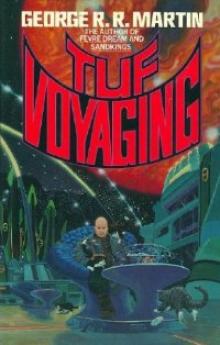 Tuf Voyaging
Tuf Voyaging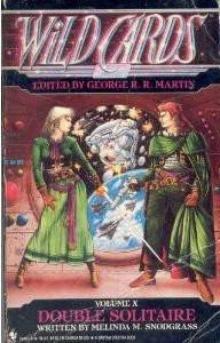 Double Solitaire
Double Solitaire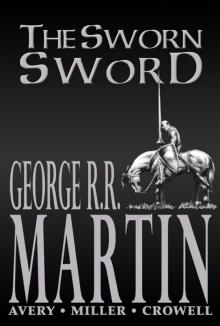 The Sworn Sword
The Sworn Sword Low Chicago
Low Chicago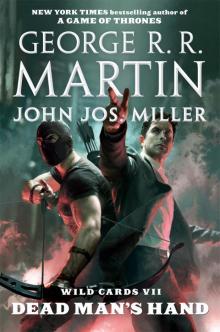 Dead Man's Hand
Dead Man's Hand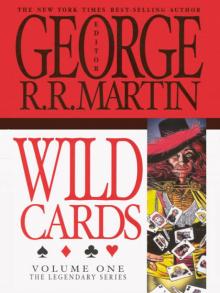 Wild Cards
Wild Cards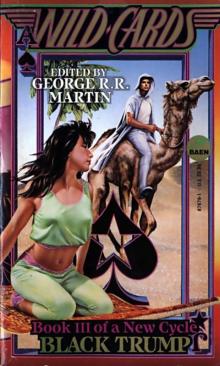 Black Trump
Black Trump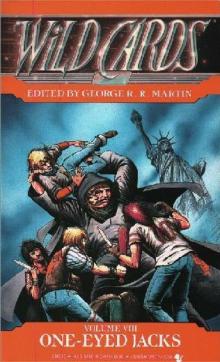 One Eyed Jacks
One Eyed Jacks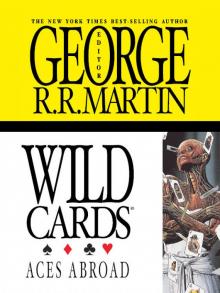 Wild Cards: Aces Abroad
Wild Cards: Aces Abroad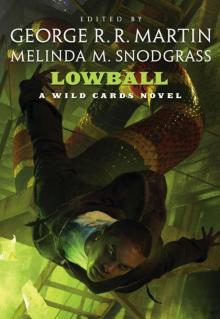 Lowball: A Wild Cards Novel
Lowball: A Wild Cards Novel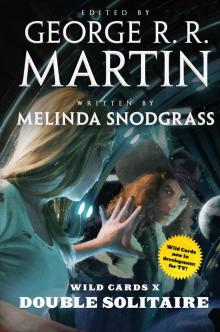 Double Solitaire (2019 Edition)
Double Solitaire (2019 Edition)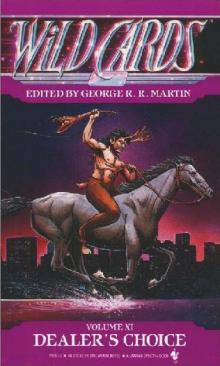 Dealer's Choice
Dealer's Choice Ace in the Hole
Ace in the Hole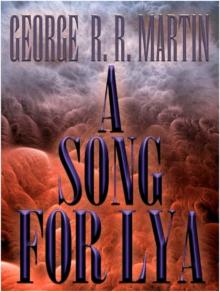 A Song for Lya: And Other Stories
A Song for Lya: And Other Stories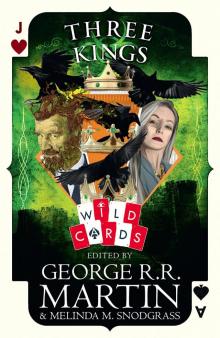 Three Kings
Three Kings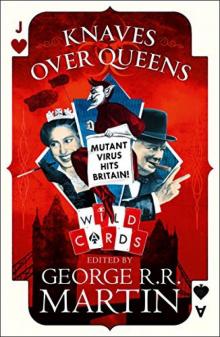 Knaves Over Queens
Knaves Over Queens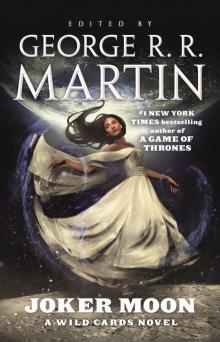 Joker Moon
Joker Moon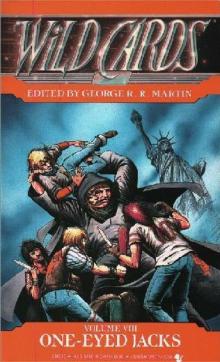 One Eyed Jacks wc-8
One Eyed Jacks wc-8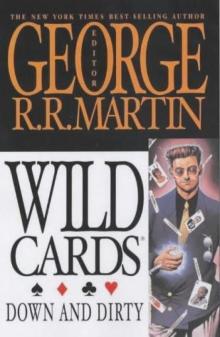 Down And Dirty wc-5
Down And Dirty wc-5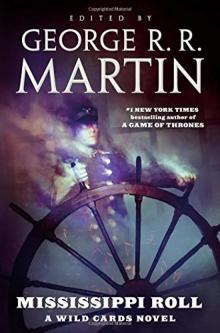 Mississippi Roll_A Wild Cards Novel
Mississippi Roll_A Wild Cards Novel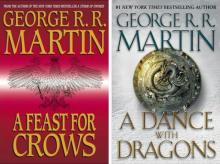 A Feast for Dragons
A Feast for Dragons The Sworn Sword ttodae-2
The Sworn Sword ttodae-2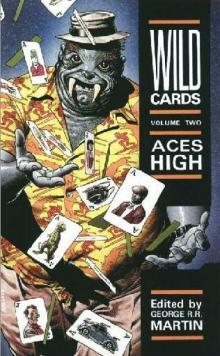 Aces High wc-2
Aces High wc-2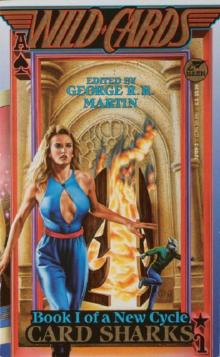 Wild Cards 13 : Card Sharks
Wild Cards 13 : Card Sharks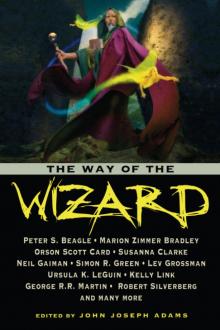 Way of the Wizard
Way of the Wizard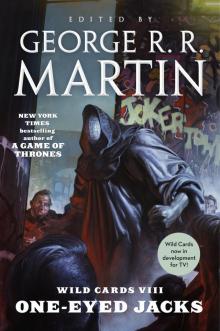 Wild Cards VIII: One-Eyed Jacks
Wild Cards VIII: One-Eyed Jacks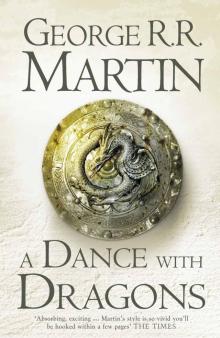 A Dance With Dragons: Book 5 of A Song of Ice and Fire (Song of Ice & Fire 5)
A Dance With Dragons: Book 5 of A Song of Ice and Fire (Song of Ice & Fire 5)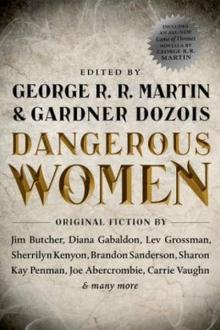 The Princess and The Queen, Or, The Blacks and The Greens (a song of ice and fire)
The Princess and The Queen, Or, The Blacks and The Greens (a song of ice and fire)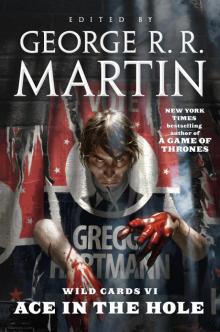 Wild Cards VI--Ace in the Hole
Wild Cards VI--Ace in the Hole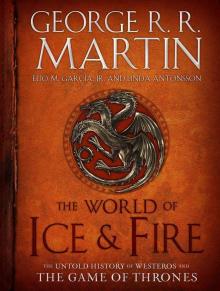 The World of Ice & Fire: The Untold History of Westeros and the Game of Thrones (A Song of Ice and Fire)
The World of Ice & Fire: The Untold History of Westeros and the Game of Thrones (A Song of Ice and Fire)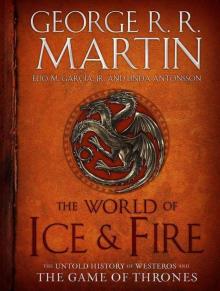 The World of Ice & Fire: The Untold History of Westeros and the Game of Thrones
The World of Ice & Fire: The Untold History of Westeros and the Game of Thrones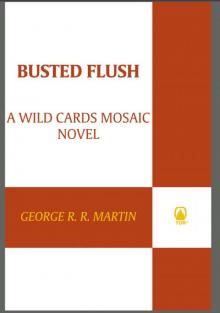 Busted Flush wc-19
Busted Flush wc-19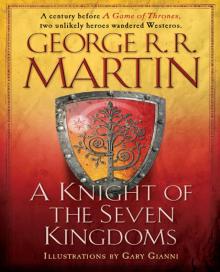 A Knight of the Seven Kingdoms
A Knight of the Seven Kingdoms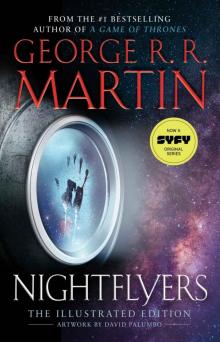 Nightflyers: The Illustrated Edition
Nightflyers: The Illustrated Edition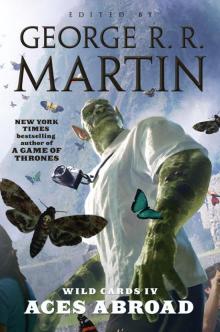 Wild Cards IV
Wild Cards IV Portraits of His Children
Portraits of His Children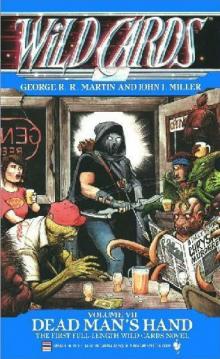 Dead Mans Hand wc-7
Dead Mans Hand wc-7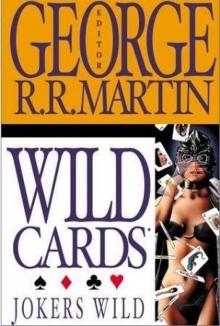 Jokers Wild wc-3
Jokers Wild wc-3 The Lonely Songs of Laren Dorr
The Lonely Songs of Laren Dorr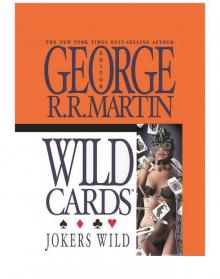 Wild Cards III: Jokers Wild
Wild Cards III: Jokers Wild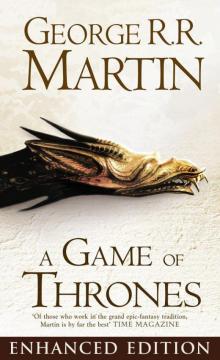 A Game of Thrones Enhanced Edition
A Game of Thrones Enhanced Edition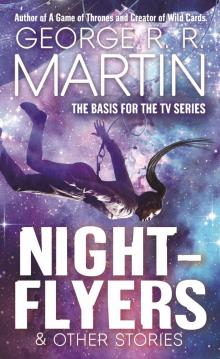 Nightflyers & Other Stories
Nightflyers & Other Stories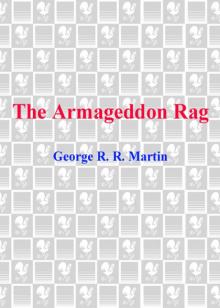 Armageddon Rag
Armageddon Rag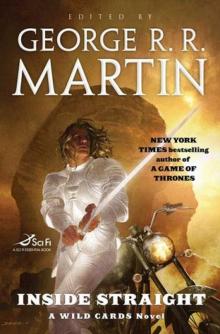 Wild Cards: Inside Straight
Wild Cards: Inside Straight A Song for Lya
A Song for Lya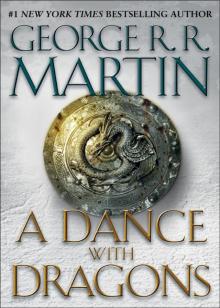 A Dance with Dragons: A Song of Ice and Fire: Book Five
A Dance with Dragons: A Song of Ice and Fire: Book Five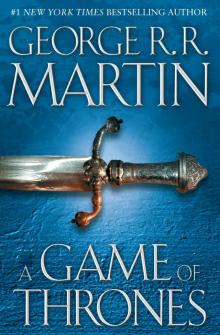 Song of Fire & Ice 01 - A Game of Thrones
Song of Fire & Ice 01 - A Game of Thrones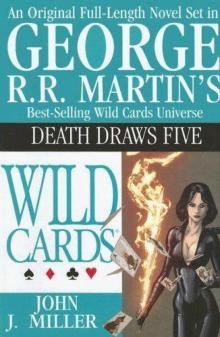 Death Draws Five wc-17
Death Draws Five wc-17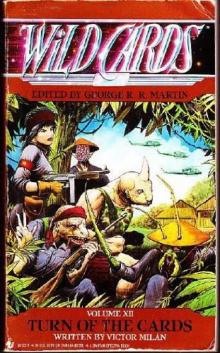 Turn of the Cards w-12
Turn of the Cards w-12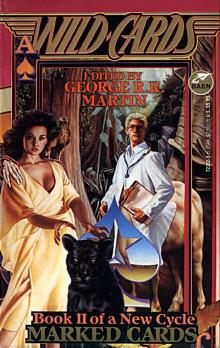 Wild Cards 14 - Marked Cards
Wild Cards 14 - Marked Cards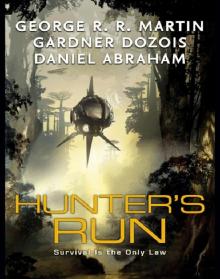 Hunter's Run
Hunter's Run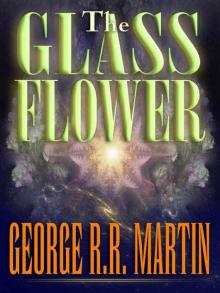 The Glass Flower
The Glass Flower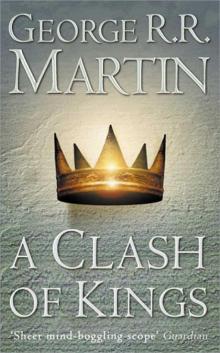 A Clash of Kings asoiaf-2
A Clash of Kings asoiaf-2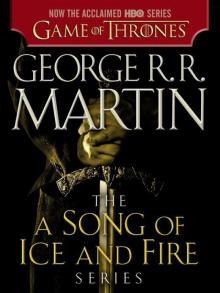 A Game of Thrones 5-Book Bundle: A Song of Ice and Fire Series: A Game of Thrones, A Clash of Kings, A Storm of Swords, A Feast for Crows, and A Dance with Dragons (Song of Ice & Fire)
A Game of Thrones 5-Book Bundle: A Song of Ice and Fire Series: A Game of Thrones, A Clash of Kings, A Storm of Swords, A Feast for Crows, and A Dance with Dragons (Song of Ice & Fire)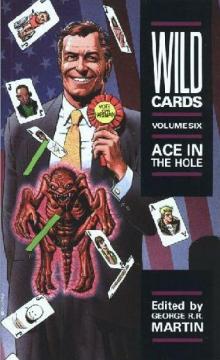 Ace In The Hole wc-6
Ace In The Hole wc-6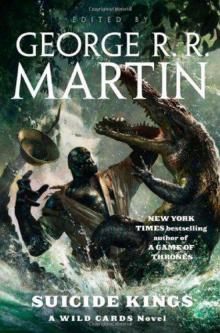 Suicide Kings wc-20
Suicide Kings wc-20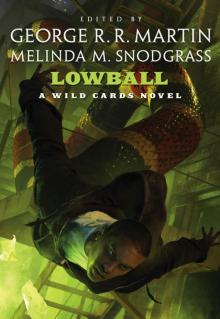 Lowball
Lowball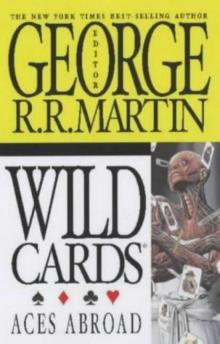 Aces Abroad wc-4
Aces Abroad wc-4 George R. R. Martin's a Game of Thrones 4-Book Bundle
George R. R. Martin's a Game of Thrones 4-Book Bundle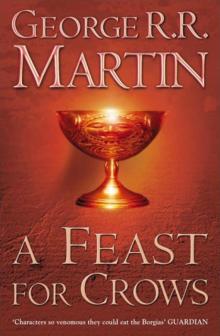 A Feast for Crows asoiaf-4
A Feast for Crows asoiaf-4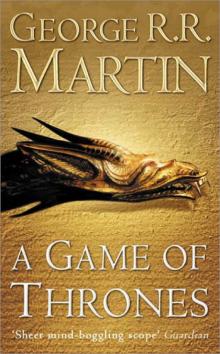 A Game of Thrones asoiaf-1
A Game of Thrones asoiaf-1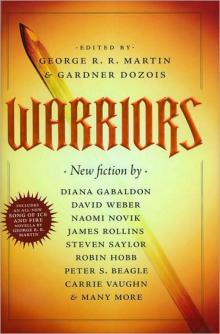 The Mystery Knight ttodae-3
The Mystery Knight ttodae-3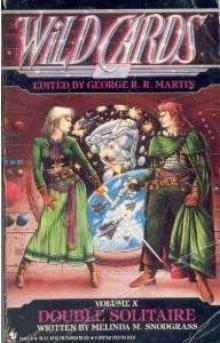 Double Solitaire w-10
Double Solitaire w-10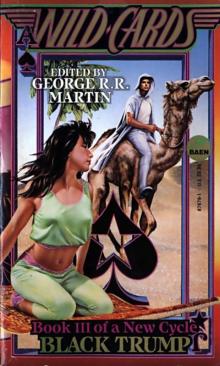 Wild Cards 15 - Black Trump
Wild Cards 15 - Black Trump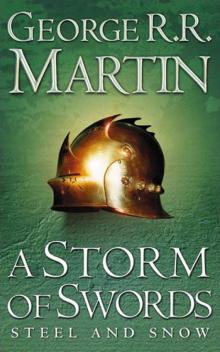 A Storm of Swords asoiaf-3
A Storm of Swords asoiaf-3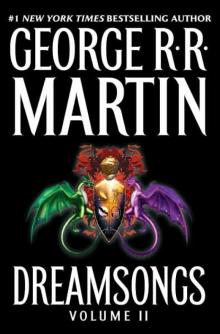 The Hedge Knight ttodae-1
The Hedge Knight ttodae-1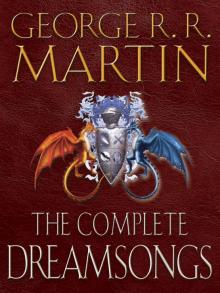 Dreamsongs 2-Book Bundle
Dreamsongs 2-Book Bundle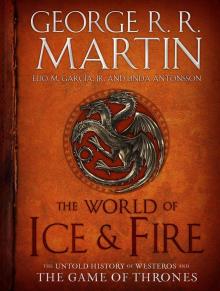 The World of Ice & Fire
The World of Ice & Fire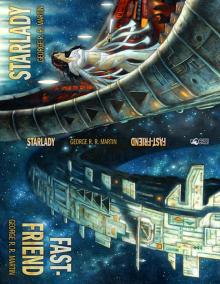 Starlady & Fast-Friend
Starlady & Fast-Friend Old Mars
Old Mars Fantasy For Good: A Charitable Anthology
Fantasy For Good: A Charitable Anthology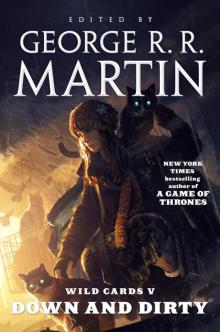 Wild Cards V
Wild Cards V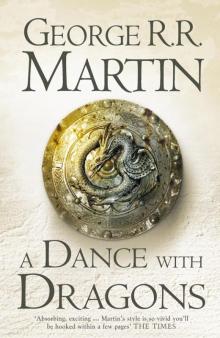 A Dance with Dragons asoiaf-5
A Dance with Dragons asoiaf-5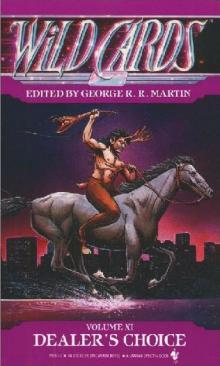 Dealer's Choice w-11
Dealer's Choice w-11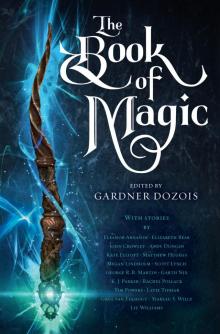 The Book of Magic
The Book of Magic A Game of Thrones 4-Book Bundle
A Game of Thrones 4-Book Bundle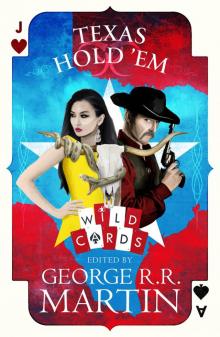 Texas Hold 'Em
Texas Hold 'Em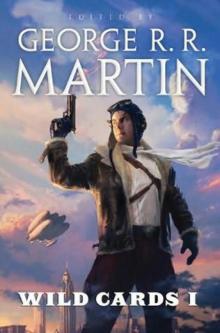 Wildcards wc-1
Wildcards wc-1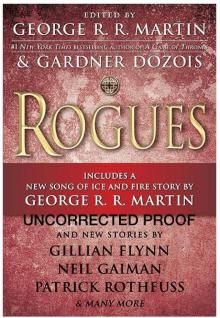 Rogues
Rogues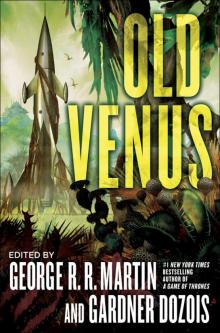 Old Venus
Old Venus